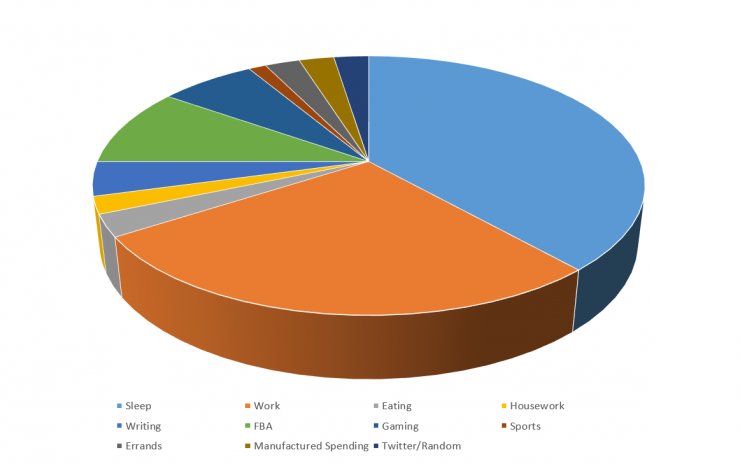Matt wrote a great post yesterday that reminded me of a post I had half written, after attending a company offsite back in August at the Hyatt Regency Chesapeake. I won’t go into too much detail, but we had a guest speaker who talked about how one can apply project management principles and processes in your every day life. It was pretty common sense, but one thing he said really struck me.
Every one of us has 168 hours per week.
Maybe it shouldn’t have struck me the way it did, but this concept of 168 hours per week, really hit home. What we choose to do with those 168 hours is usually defined by a collection of commitments, goals, desires, and needs. I think Leigh’s comment on another one of Matt’s post further highlights how limiting, having only 168 hours per week truly is. I would argue that it is even more important in a Post Redbird environment, as folks are formulating their revised Manufacturing Spending strategies.
For example, on average, people need 8 hours of sleep a day.
– Subtract 56 hours, now we’re left with 112 hours.
Most of us work, and work is generally expected to be a minimum of a 40 hour week, so now we’re down to 72 hours. You read that right, the equivalent of 4 days of your week are already for the most part committed to work and sleep.
So, what do you do with your 72 hours per week? First of all, you’ve got to eat, commute to your job during the week, and a collection of other routine maintenance things. Lets say that’s 2 hours per day. Now we’re down to 58 hours.
This is where you start to get into your free time. It is amazing, that in an ideal scenario, your free time is just over 1/3rd of your week.
I did the math for myself, assuming one of those random weeks where I’m not traveling. Here’s where I came out on a weekday:
- Sleep – 9 hours allocated (although I don’t always sleep for 9, I make it a point to be in bed roughly 9 hours before I need to wake up.
- Work – 9 hours allocated – on average, I put in 8.5-9 hours a day.
- Commuting to work – 1 hour allocated round trip – I’m pretty lucky here, I have a less than 30 minute commute each way, so, rounding up for ease here.
- Eating – 30 minutes per day – usually I multi-task, but every so often I have to cook.
- Housework – 30 minutes – I try to do my part to help out around the house, this usually means things like laundry, dishes, vacuuming, standard stuff.
- Writing – 1 hour – that’s probably under cutting it a bit, but, I do try to spend an hour a day writing, or doing other research for Tagging Miles.
- FBA – 2 hours – I’ll usually intersperse looking for reselling products with writing, or catching up on Twitter.
- Gaming – 1 hour – This is how I try to clear my mind before bed.
For a weekend, I usually switch out work with some Manufactured Spending (MS), errands, FBA, more gaming, with some sports watching in the background thrown in. Here’s the rough breakdown:
- Manufactured Spending 2 hours
- Errands – 2 hours
- Eating – 1 hour
- FBA – 3 hours (total)
- Gaming – 3 hours (total)
- Sports/TV/Movie – 1 hour (although the TV is generally on in the background throughout the day).
What does that tell me? well, I like to look at things graphically, so here’s that:
But really what does it tell me? Other than the fact that I allocate way too much time to sleep, I spend a bunch of time working. My next largest time commitment is Fulfillment by Amazon (FBA), which is logical, as I’m trying to build that business as a side gig. Beyond that, I spend a fair amount of time writing and gaming. Hey, we all have to de-stress one way or another.
Perhaps the biggest message I see here though, is that your opportunity to innovate on a weekly basis is pretty limited. Of course, there is a rather large block of time, aka, work, where you could take time off, to focus on innovating, or to travel. I’ll be honest, I burn nearly all of my vacation, of course, do I spend time trying to innovate while on vacation? Of course, because, well, I don’t shut down well.
What’s my point?
I think what this really comes down to is, you have 168 hours, each week. That’s it. What you choose to do with those 168 hours highlights what your priorities are. As Matt highlights in his post, there are plenty of options to outsource or drop things, but really, your are in command of your 168 hours. In the words of the the Knight in Indiana Jones and the Last Crusade – Choose Wisely.
How do you allocate your 168 hours per week?

Looks like you might consider rearranging a bit to add in exercise – but I am not one to talk because I don’t prioritize that either!
@ES – you make a very valid point… I do not really allocate much time to exercise.